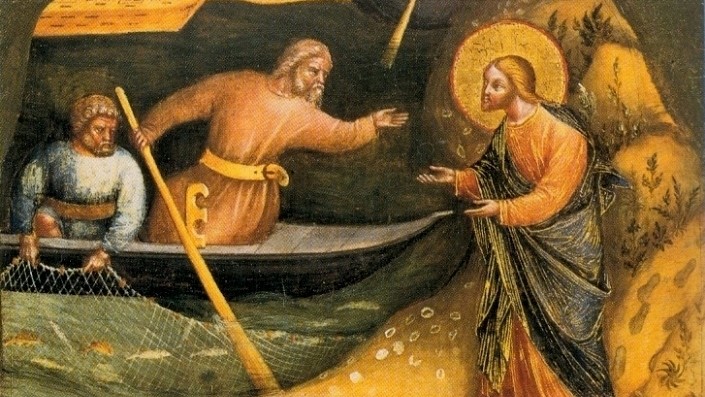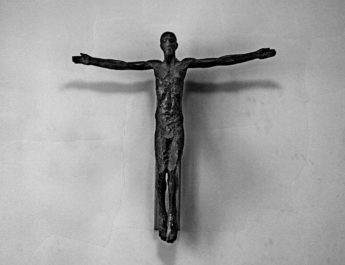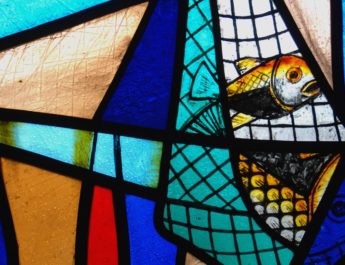Matthew 4:12-23
Ordinary A9
12 Now when Jesus heard that JohnA had been arrested,B he withdrewC to Galilee.D 13 He left NazarethE and made his homeF in CapernaumG by the sea,H in the territory of ZebulunI and Naphtali,J 14 so that what had been spoken through the prophetK IsaiahL might be fulfilled:M
A “John” = ioannes. From Hebrew yochanan (Johanan); from Yehochanan (“the Lord has been gracious”); from YHVH (proper name of the God of Israel); [from havah (to become); from hayah (to be, exist, happen)] + chanan (beseech, show favor, be gracious; properly, to bend in kindness to someone with less status). This is John.
B “arrested” = paradidomi. From para (from beside, by, by the side of) + didomi (give, offer, put, place; give literally or figuratively). This is to hand over, give over, deliver, pledge, betray, abandon.
C “withdrew” = anachoreo. 14x in NT. From ana (up, again, back, among, in turn, by, anew) + choreo (to make room, advance, receive, accept, make progress; to make room by leaving, giving space; figuratively, living in an open-hearted way) [from choros (space, place); from chora (land, country, region); from the base of chasma (chasm, gap, gulf); from chasko (to yawn)]. This is to go back, withdraw, depart, return. It can denote retiring away from somewhere or seeking refuge from a dangerous situation.
D “Galilee” = Galilaia. From Hebrew galil (cylinder, rod, circuit, district); from galal (to roll, roll away, remove, trust, wallow). This is Galilee the region as well as the sea.
E “Nazareth” = Nazareth. 12x in NT. Perhaps from netser (branch) OR from natsar (to watch, guard, or keep). Nazareth, meaning watchtower, guard place, preserved, or protected). This is a city in Galilee.
F “made…home” = katoikeo. From kata (down, among) + oikeo (to inhabit, live, dwell; to make a home or live at home) [from oikos (home – the building itself or one’s household i.e. family, lineage, etc)]. This is literally “to down home” or “to home among.” It is being established permanently i.e. settling down. Figuratively speaking, it means to be right at home.
G “Capernaum” = Kapernaoum. 16x in NT. From Kapharnaoum (Capernaum); from Hebrew kaphar (village; a village with walls) [from kaphar (to cover over; figuratively to placate, condone, make reconciliation, or make atonement)] + Nachum (Nahum, the prophet; meaning comfortable) [from nacham (properly, is a strong breath or a sigh; to be sorry, to pity, console. comfort, or repent; one can also comfort oneself with less righteous thoughts, so this can also mean to avenge oneself)]. This is Capernaum, a village in Galilee perhaps meaning Nahum’s Village or Village of Comfort.
H “by the sea” = parathalassios. 1x in NT. From para (from beside, by, by the side of) + thalassa (the sea as compared to the land; a specific sea or lake, seashore) [perhaps from hals (salt, sea, body of water that is salt water) or halas (salt; used figuratively to mean prudence)]. This is by the sea or on the coast.
I “Zebulun” = Zaboulon. 3x in NT. From Hebrew Zebulun (Zebulun; the son of Jacob, his descendants, and the land they inhabited); from zabal (to inclose and so to reside, to dwell). This is Zebulun, which may mean habitation or something similar.
J “Naphtali” = Nephthalim. 3x in NT. From Hebrew Naphtali (Naphtali; the son of Jacob, his descendants, and the land they inhabited); from pathal (to twist, twine, wrestle, struggle). This is Naphtali, which means my wrestling. It refers to the son of Jacob, his descendants, and the land they inhabited.
K “prophet” = prophetes. From pro (before, in front of, earlier than) + phemi (to declare, say, use contrasts in speaking to shed light on one point of view). Phemi is from phao (to shine) or phaino (to bring light, cause to appear, shine, become visible or clear). This is a prophet or poet. One who speaks with inspiration from God
L “Isaiah” = Esaias. From Hebrew Yeshayahu (Isaiah; salvation of the Lord); from yasha (to deliver, defend, help, preserve, rescue; properly, to be open, wide or free, which implies being safe. So, in a causative sense, this is to free someone.) + Yah (name of the God of Israel) {from YHVH (God, the Lord, the self-existent and eternal one); from hayah (to become)}. This is Isaiah, meaning salvation of the Lord.
M “fulfilled” = pleroo. From pleres (to be full, complete, abounding in, occupied with). This is to fill, make full or complete. Properly, this is filling something up to the maximum extent that it can be filled – an appropriate amount for its individual capacity. So, this is used figuratively for furnish, influence, satisfy, finish, preach, perfect, and fulfill.
15 “Land of Zebulun, land of Naphtali,
on the road by the sea,N across the Jordan,O Galilee of the Gentiles—P
16 the peopleQ who sat in darknessR
have seenS a great light,T
and for those who sat in the region and shadowU of death
light has dawned.”V
N “sea” = thalassa. Related to “by the sea” in v13. See note H above.
O “Jordan” = iordanes. 15x in NT. From Hebrew Yarden (Jordan River); from yarad (to go or come down; figuratively to fall; can also be used causatively to mean bring down). This is the Jordan, largest river in Palestine.
P “Gentiles” = ethnos. Probably from etho (a custom or culture). This is people who are united by having similar customs or culture. Generally, it is used to refer to Gentiles. This is a tribe, race, nation, or Gentiles in general. This is where the term “ethnicity” comes from.
Q “people” = laos. This is the people or crowd – often used for the chosen people. This is where the word “laity” comes from.
R “darkness” = skotia. 16x in NT. From skotos (darkness, whether literal or figurative; can be obscurity, sin, shadiness); from the base of skia (shadow, shade, darkness, outline; figurative of spiritual reality whether positive or negative). This is darkness or dimness. It can also have a figurative sense of spiritual darkness or moral obscurity.
S “seen” = horao. To see, perceive, attend to, look upon, experience. Properly, to stare at and so implying clear discernment. This, by extension, would indicate attending to what was seen and learned. This is to see, often with a metaphorical sense. Can include inward spiritual seeing.
T “light” = phos. From phao (to shine or make visible, especially with rays of light); from the same as phaino (to bring light, cause to appear, shine, become visible or clear). This is light, a source of light, fire, or radiance. This is light with specific reference to what it reveals. It is luminousness whether natural or artificial, abstract or concrete, literal or figurative.
U “shadow” = skia. Related to “darkness” in v16. 7x in NT. See note R above.
V “dawned” = anatello. 9x in NT. From ana (up, again, back, among, in turn, by, anew) + tello (to cause to arise) [from the base of telos (the final goal of a particular act – the point at which it is completed of consummated. It could imply accomplishing something in stages and completely finishing one of those stages. It can mean end, toll, aim, purpose, or tax. Can be used in a literal or figurative sense)]. This is to cause to rise, shine, to dawn. It is usually used of the sun’s rising, but can also mean rising after finishing what needed to be done. So, figuratively, this can mean completing a goal.
17 From that time JesusW began to proclaim,X “Repent,Y for the kingdom of heavenZ has come near.”AA
W “Jesus” = iesous. From Hebrew Yehoshua (Joshua, the Lord is salvation); from YHVH (proper name of the God of Israel; the self-existent and eternal one); [from havah (to become) or from hayah (to come to pass, become, be)] + yasha (to deliver, defend, help, preserve, rescue; properly, to be open, wide or free, which implies being safe. So, in a causative sense, this is to free someone.) This is Jesus or Joshua in Greek – the Lord saves or the Lord is salvation.
X “proclaim” = kerusso. To announce or preach something in a public setting and doing so persuasively and with conviction. Can also be acting as a herald or preacher.
Y “repent” = metanoeo. From meta (with, among, after, beyond) + noieo (to perceive, think, understand). Noieo is from nous (mind, understanding, reasoning faculty, intellect, capacity to reflect). This is literally to change one’s mind – to choose to think differently and so to act differently because of a moral compunction. It is an intentional change to the inner self. This word shares a root with the English “paranoia.”
Z “heaven” = ouranos. May be related to oros (mountain, hill) with the notion of height. This is the air, the sky, the atmosphere, and heaven. It is the sky that is visible and the spiritual heaven where God dwells. Heaven implies happiness, power, and eternity.
AA “come near” = eggizo. From eggus (nearby or near in time); from agcho (to squeeze, to throttle). This is to bring near, approach, be at hand. It describes something that is very close, with immediacy.
18 As he walkedBB by the Sea of Galilee, he saw two brothers,CC Simon,DD who is called Peter,EE and AndrewFF his brother, casting a netGG into the sea—for they were fishermen.HH 19 And he said to them, “FollowII me, and I will make you fish for people.”JJ 20 Immediately they left their netsKK and followedLL him.
BB “walked” = peripateo. From peri (about, concerning, around, encompassing) + pateo (to read, trample on; to trample literally or figuratively) [from patos (trodden) OR from paio (to strike, smite, sting; a hit like a single blow)]. This is to walk. Going from Hebrew figurative languish, to walk referred to how you conducted your life, how you chose to live. This word is most literally walking around. Figuratively, it is living, behaving, following, how you occupy yourself. This is where “peripatetic” comes from.
CC “brothers” = adelphos. From a (with; denotes fellowship) + delphus (womb). This is brother literal or figurative. Properly, this is one who shares a womb with you. Can also be used for a fellow Christian.
DD “Simon” = simon. From Herew Shimon (Simeon, son of Jacob, his tribe, and others); from shama (to hear, call, consent, or consider. It implies listening intelligently, giving attention, and, because of these two factors, obedience and action are often implied). This is Simon – the one who hears.
EE “Peter” = petros. Related to petra (a large mass of connected rock as a ledge, cliff, cave, or stony ground). This is Peter, stone, pebble, boulder. It is rock that is detached. This name seems to be original to the New Testament.
FF “Andrew” = andreas. 13x in NT. From aner (man, husband, sir). This is Andrew, meaning manly.
GG “net” = amphiblestron. Related to “casting” in v18. 1x in NT. From amphoteros (both, all) [from ampho (on both sides, around)] + ballo (to throw, cast, rush, place, drop; any throwing whether intense and violent or not). This is properly a thing that is thrown around. Used specifically to describe a drag net style of fishing net.
HH “fishermen” = halieus. Related to “by the sea” in v13 & “sea” in v15. 5x in NT – all when Jesus calls his first disciples in the Gospels. From hals (see note H above). This is a sailor, which implied a fisherman. This word, whose root comes from the word of salt, is applied to all fishermen even though the Sea of Galilee is a freshwater lake.
II “follow” = deute. 12x in NT. From deuro (come here, now, the present; “come” as an exclamation). This is come here, come away, or follow as an exclamation.
JJ “people” = anthropos. Probably from aner (man, male) + ops (eye, face). This is human or humankind – does not solely apply to men. This is where anthropology comes from.
KK “nets” = diktuon. 12x in NT – all in the Gospels in Jesus calling his first disciples and in the resurrection appearance in Jn 21. From dikein (to cast); probably from diko (to cast). This is a broader term for a fishing net or a net used for hunting other creatures such as birds.
LL “followed” = akoloutheo. From a (with, union) + keleuthos (road, way). This is to follow, accompany, or attend. It is often used to describe the way that disciples follow.
21 As he went from there, he saw two other brothers, JamesMM son of ZebedeeNN and his brother John, in the boatOO with their father Zebedee, mendingPP their nets, and he called them. 22 Immediately they left the boat and their father, and followed him.
MM “James” = iakobos. From the same as Iakob (Jacob); from Hebrew Yaakob (Jacob, son of Isaac, and his descendants); from the same as aqeb (heel, footprint, horse hoof, one who lies in wait). This is Jacob, son of Isaac, and his descendants. It means heel, supplanter, or usurper.
NN “Zebedee” = Zebedaios. 12x in NT. From Hebrew Zebadyah (Zebadiah, “The Lord has bestowed,” a name); [from Zabad (to endow with, confer, bestow upon) + Yah (see note L above).] This is Zebedee, meaning “the Lord has bestowed.”
OO “boat” = ploion. From pleo (to sail; properly, to wash); from pluo (to flow through water or plunge into water as when one washes clothing). This is a boat or other sailing vessel.
PP “mending” = katartizo. 13x in NT. From kata (down, against, according to, throughout, among) + artizo (to prepare, ready) [from artios (ready, fresh, complete, prepared to function in an efficient way right away); from arti (this moment, now); from a derivative of airo (to raise, lift up, take away, remove; can be used to mean expiate sin)]. This is to prepare, complete, equip, mend, join together, make something complete, restore. It can be to make something ready to use whether for the first time or as an act of repairing. It can also mean perfect or adjust.
23 Jesus went throughout Galilee, teaching in their synagoguesQQ and proclaiming the good newsRR of the kingdom and curingSS every diseaseTT and every sicknessUU among the people.
QQ “synagogues” = sunagoge. Related to “went” in v23. From sunago (to lead or bring together, collect, assemble, convene; can also mean receive as a guest or entertain) [from sun (with, together with) + ago (lead, bring, carry, guide, go, drive)]. This is a synagogue, assembly, or congregation. Properly, it is a bringing together, hence and assembly. It can refer to the place of assembly or the people assembled there. It is used specifically for Jewish synagogues (and is the root of that word), but is also sometimes used of the church in the New Testament.
RR “good news” = euaggelion. Perhaps related to “went” & “synagogues” in v23. From the same as euaggelizo (to announce good news, preach glad tidings. It can be used of the people hearing the news or the good news itself. Used especially of preaching the gospel); [from eu (well, good, rightly) + aggelos (angel, messenger; a messenger from God bringing news – whether a prophet or an angel) [from aggellos (to bring tidings); probably from ago (to bring, lead, carry, guide).]. This is the good news, gospel, good tidings. This word shares a root with evangelism.
SS “curing” = therapeuo. From therapon (servant, minister; one who serves in some way); perhaps from theros (properly heat, which implies summer); from thero (to heat). This is to serve, care, attend. It is often used of physicians so can mean sure, treat, or heal. It can also be used of ministers waiting on or adoring God so it can mean worship. This is the root of the word therapy.
TT “disease” = nosos. 11x in NT. This is a chronic illness and not an acute disease. This word is sometimes used in scripture for a moral difficulty.
UU “sickness” = malakia. 3x in NT. From malakos (soft, effeminate, delicate; can refer to fine clothing). This is softness literally, but implies an illness that causes the sufferer to be weaker or in some form disabled.
Image Credit: “The Calling of the Apostles Peter and Andrew” by Lorenzo Veneziano, 1370.




